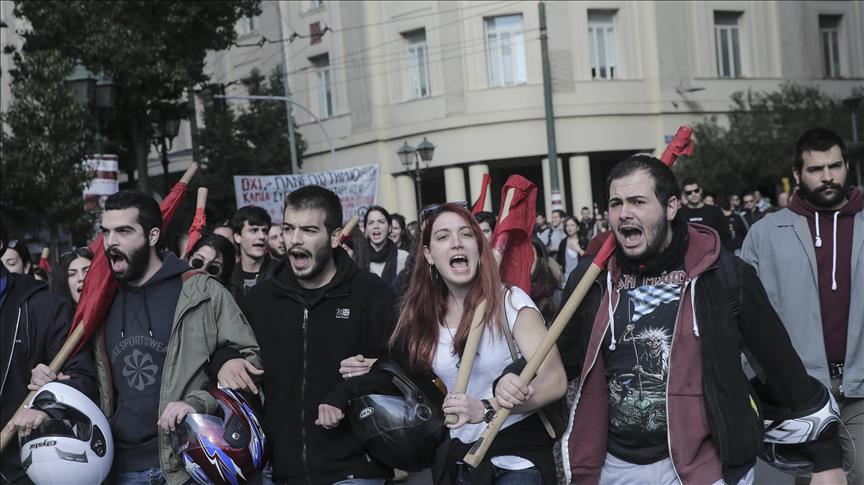 Thousands of people shout slogans as they attend a 24-hour general strike to protest the government policies in Athens, Greece on December 14, 2017. ( Ayhan Mehmet - Anadolu Agency )
Thousands of people shout slogans as they attend a 24-hour general strike to protest the government policies in Athens, Greece on December 14, 2017. ( Ayhan Mehmet - Anadolu Agency )
By Magda Panoutsopoulou
ATHENS
A 24-hour general strike brought parts of Greece to a standstill on Thursday, as thousands of workers protested over continued austerity measures and in fear of new ones.
Greece’s two largest private and public unions, GSEE and ADEDY, marched from Klathmonos square, joining forces along the way with the Greek Communist Party-affiliated union, PAME.
Demonstrators held banners saying “Poverty, Taxes, Unemployment” marching towards Parliament, the site of the 2018 budget debate.
Crowds gathered in Athens to demonstrate against what they see as oppression by Greece’s European and international lenders, as well as betrayal from the Greek government that in 2014 promised otherwise.
Christos Delis, 35, who said he has been unemployed since 2014, chanted the word “liars” while marching towards Parliament.
“No to more of these reforms, it’s enough, we’re tired and we’re suffering,” he said.
Public transport stopped as metro, tram, bus and rail workers joined the protests. Ships have remained docked in ports, isolating mainland Greece from the islands for 24 hours. Air traffic control employees are also participating in the stoppage, disrupting flights.

Hospitals as well as state schools remained shut.
Greece has been the recipient of three bailout deals since 2010. It has worked to avoid bankruptcy with the financial help of the International Monetary Fund, European Union, and the European Central Bank and borrowed what amounts to €260 billion ($306 billion).
The country recently reached a deal with its lenders on reforms that they must perform under its bailout program, in a hope to end the aid program by August.
In return for the money borrowed, the leftist government had to impose tax hikes, more structural reforms, as well as pension cuts that have angered austerity-hit Greeks.
Ahead in the plans of Syriza, the current ruling party that once led demonstrations, is a law to tighten the rules on calling for a strike.
Anadolu Agency website contains only a portion of the news stories offered to subscribers in the AA News Broadcasting System (HAS), and in summarized form. Please contact us for subscription options.







